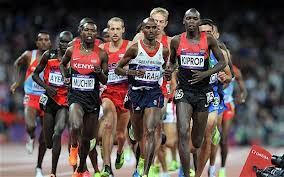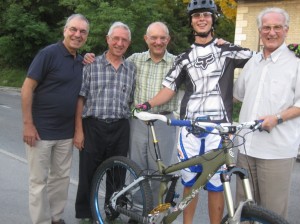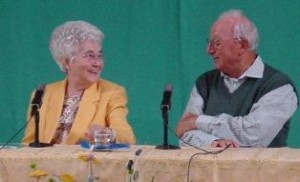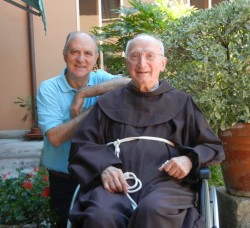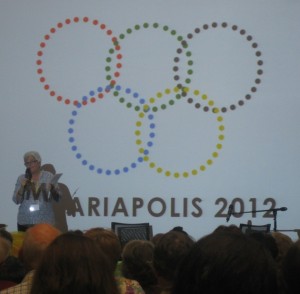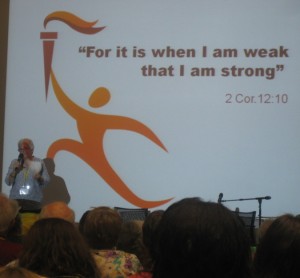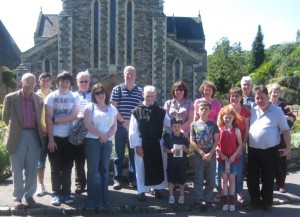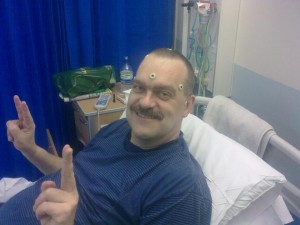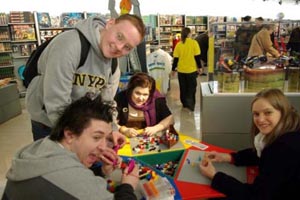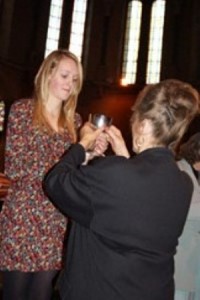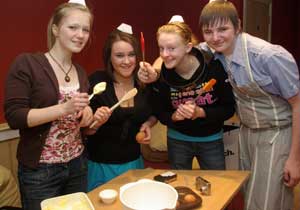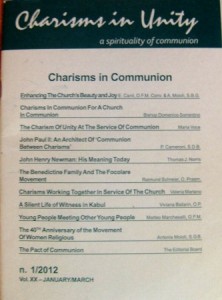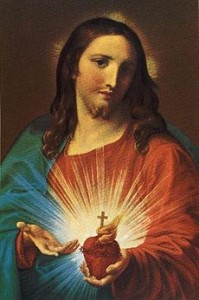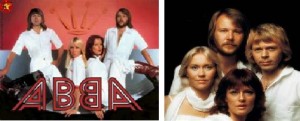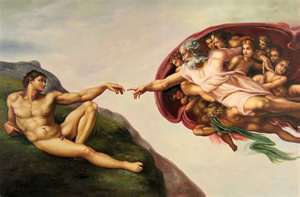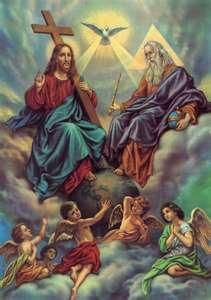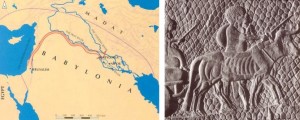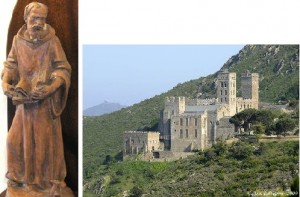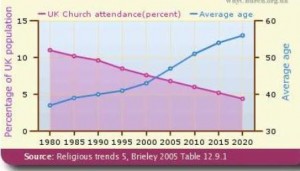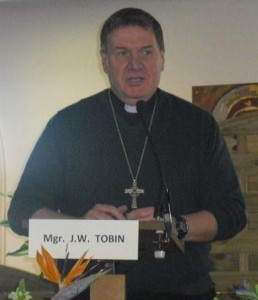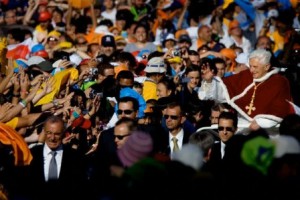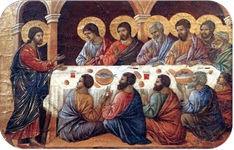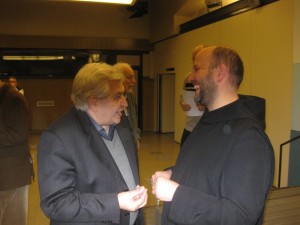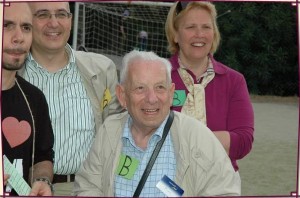The ‘Word of God’ cleanses us and accomplishes what it is meant to do:
“So shall my word be that goes out from my mouth; it shall not return to me empty, but it shall accomplish that which I purpose, and shall succeed in the thing for which I sent it.” (Isaiah 55: 11). “You have already been cleansed by the Word that I have spoken to you.” (John 15: 3)
I think when the disciples heard this clear word of encouragement spoken by Jesus, their hearts must have leapt for joy.
The Word of God is seldom put into prominence in tuition courses, to prepare people for initiation into Christian Life, and this is a serious omission. Why do we not emphasise God’s Word, when Jesus, alone, has the words of eternal life, according to Simon Peter, (in John 6: 68), and there is nowhere else to find these words? In fact, speaking in the name of the disciples, Simon Peter goes on to say: “… we have come to believe and know that you are the Holy One of God”. (John 6: 69)
I suspect it is hard to explain the importance of the Word of God, in words that make sense. Yet, increasingly this year, I am aware that the Word of God is something practical and real – something that brings about personal union with God, and with others – others who also lead me to God.
We need to be inserted like branches into the ‘tree’ of the Word of God, and pruned as well.
The sacraments are essential, but they are over in a short time; Mass may be 25 minutes long. However, I can be in union with God through the Word, each day, and every day, and that is what I want and need. This is because, if I understand God aright, he is our Father and my Father; He takes a personal interest in me, and is the only one who will lead me, a monk and a priest, through the ‘spiders’ web’ of complicated lives that we all live. He is my real friend, my only ‘Good’, and I know and love Him, because of the Word of God; I am also very aware that He knows and loves me.
Below are some ideas that have crossed my mind concerning the reasons why Catholic Christians, at least, do not emphasise the Word of God enough.
Ignorance of Scripture is ignorance of Christ, like being unable to see the beauty of Creation around us.
The Word of God is not just about the scripture, though scripture is essential. On this point, St. Jerome wrote that ‘Ignorance of Scripture is Ignorance of Christ’. Yet, at the same time, I know many Catholic Christians who have certainly known Christ, but would not have known much of the Scripture! They did the essential thing: they lived the Word of God, as interpreted by those in the Church, who had taught them.
For many, the words of the Bible are opaque and difficult, and to some even irrelevant. Yet, the Word of God is about a whole experience of life, and words alone cannot do justice, adequately, to this whole experience. The experience I speak of is the experience of loving – and being loved in return; it is what psychologists, like Eric Fromm, speak about, but it is not just something human. No, rather it is of God, divine. The nature of God is Love, according to the scriptures, (1 John 4: 16), and so there must be ‘relationship’ in God, because Love does not permit of ‘solus cum solo’ – the alone with the alone. (In passing, this is no judgement on the value and love of that ‘silence’ of being alone with God, for silence is essential, if we are to know God; it is just that solitude is not what human beings are made for; all of us are made for companionship with God, who is Love, and each other.) When a person truly lives the Love of God, the heart of the Scriptures, then there must be something of a giving and receiving, something that reflects, on earth, the presence of God, who is Love.
The Word of God reaches its culmination – its high point – for those of us who are trying to be disciples of Jesus, in living what Jesus called, ‘My Commandment’: “… love one another as I have loved you” (John 15: 12). This edict of Jesus is repeated again, and again, by those who teach about the meaning of Christianity, in Church, but people do not live out its obvious implications. It is too much of a commitment, and yet it is the path to freedom.
Love one another as I have loved you
The Word of God is intimate to – and in – my own personal life. Intimate things are not easily shared, and many intimate things should not be shared, except with those who share that intimacy. We can be intimate in God, or destroy intimacy by being intimate outside God’s will. When we are in – and part of – the divine type of intimate relationship, the Word is operating right down – and through to – the ‘marrow of life’ and it is here that we find ‘family’, also. In a family we are truly intimate, and that life is a hidden, secret life, that should not be put on display. Human family life can be either a heaven or a hell; it depends, not on luck, or good fortune, or on a right chemistry, or on anything from, merely, the temporal below; it must include the above, the spiritual, the Godly. At its best, it depends on the bond of family life being formed in true love, not the ‘masquerade’ we humans all too often call ‘love’, which is often self-centred, and is not the self-giving Love that is of God.
If we have companions with whom we live the New Commandment of Jesus, then we have a family in which the members are not just of the same blood, but all have that inner spirit – a spirit so powerful that all would be ready to give their lives for each other. That spirit within, a gift of the Holy Spirit, is what enables a family, even one that seems outwardly disastrous, to be, inwardly, a family in heaven; I have come across such nuclear, human families.
A Franciscan and a Benedictine in strong conversation. Some readers may recognise Fr. Suawek OSB who stayed in Leyland
I remember well the first time I said, explicitly, to somebody, and he replied in the same vein to me, that we were ready to give our lives for each other. Events had transpired to make me rather ill. In 1977, I was diagnosed as suffering from a stomach ulcer, and Abbot Ambrose allowed me to leave Ampleforth, my monastery in North Yorkshire, to go and recuperate with a Franciscan community, in a retreat house fairly near Padua, in North East Italy. It took three months for the cure to be effected.
The community of three Friars were all dedicated in their religious life, and all were trying to live that vocational calling according to the Gospel precept of the New Commandment. One of the three was less talkative than the others. He was a straight-forward, hard-working man, who spent his mornings in the retreat house, cooking for the many visitors, sometimes more than a hundred. I had begun to realise that God was calling me to make this step, of actually ‘declaring to somebody’ that I was ready to give my life for them, and so, tentatively, I said this in a quiet way, to this unassuming and good man, Fr. Bruno. He smiled at me, as he was climbing the steps from the kitchen, below ground level, obviously tired after a hard morning, and very simply, he said: “Of course, Jonathan, I too am ready to give my life for you”. It was all over in that very natural, very easy, very quick and very simple way. There was no fuss! A joy entered my heart, that day, and it continues to this day, as with others, I live the same “Word of God”. Moreover, whenever I meet Bruno, whom I do still see from time to time, at international meetings of religious, we renew this agreement, sometimes with a smile of recognition, sometimes in words. Such actions change things, and make ‘the Family of the Body of Christ” real.
There is a little section in the new revised, standard version of the Gospel of Luke that has the heading, “The True Kindred of Jesus”. In that translation it goes like this:
“Then his mother and his brothers came to him, but they could not reach him because of the crowd. And he was told, ‘Your mother and your brothers are standing outside, wanting to see you. But he said to them, ‘My mother and my brothers are those who hear the word of God, and do it.” (Luke 8: 19-21).
The Word of God, as spoken by Jesus, himself, in this passage – Jesus, who is the Word of God – implies that the Family of God is bigger, and wider, even than our natural family, and that those who belong to the kindred of Jesus, can be mothers, brothers and sisters of Christ himself. We actually ‘generate’ the Lord, himself, when together we live out the Gospel, for Jesus also said: “Where two or three are gathered in my name, I am there among them.” (Mt 18: 20).
Every day, in little things, and big, God is revealing himself to us in his Word, if we, consciously, try to put that Word into practice. This is all the more clear, when we do so with others. Usually, the events are quite small, and so was the one I turn to now.
One day, quite recently, I was with many others all round the world, trying to put into practice the Word of God: ‘You have already been cleansed by the word that I have spoken to you’ (Jn 15:3). It was one of those days in which I had a great deal to do, and not enough time to do everything. The following short episode helps me to know that God is my father too – father to me, as an ordinary man, whom he has called to have responsibility in a big parish, as a monk and a priest. Each day, to help live the Word, I receive from my friends a word of encouragement – a ‘password’ – to help me focus on the Word of God, the ‘Word of Life’ for that month. On this particular April day, it was:
‘Proclaim the Word’.
Related to the above, I wrote down a short experience for someone with whom I share this mutual experience of living the Word, including the New Commandment.
“This is a short password and to the point. As I write, the sky is blue and clear, and it is a super morning. Off to jail today, and straight after a wedding.
Thank God that yesterday I was able to finish doing what I had to do as there were two families I wanted to visit and it took ages, from 6.15 – 8.45 pm, both very good and elderly parishioners. The first visit was to the grandparents of the man being married today. Grandma’ is too ill to come to the wedding, and she is upset about that. But, in conversation, it turned out that the Granddad is also ill, with a heart condition that I knew nothing about. He is coming to the wedding, only to Church, not to the reception. So, it was good to let them share with me, and even let off steam a bit. I was also able to give them the sacrament of the sick, and they were very happy about that.
We are not just children of our own natural family, but we are children of God.
With the second couple I prayed – the husband Eddie is sick and has been in his special bed, unable to eat or drink except through a tube, for 7 months, and unable to speak. He is 82 or so, and his wife about 80, and she looks after him with a devotion that would be similar to Anna and Simeon, going into the temple each day. To my shame I see both these couples rarely. I did enjoy going to visit them. She offered me something to eat, a balm-cake and a chocolate biscuit. That meant I did not need to worry about getting food ready when I returned home. We prayed, as I left them at 8.30 pm, that I could finish what I had to do: put the bulletin on the website, (takes an hour or so), add a new front to the website, prepare two sermons; one for the prison and one for the wedding. Unusually, it all was fairly easy, and I had finished everything by 11.30pm. And so, that was another little miracle – just a little one. Perhaps, we should be able to enlarge on them, as yesterday’s ‘password’ was that the ‘Word moves Mountains’: a more challenging proposition! ”
How can I deny that God is my Father, when each day, there are so many experiences like this one, all of them making a practical difference to my life?
“The Word of God cleanses us and accomplishes what it is meant to do.”
To view and read this blog – without disruption to the formatting – please go to the main blog site
